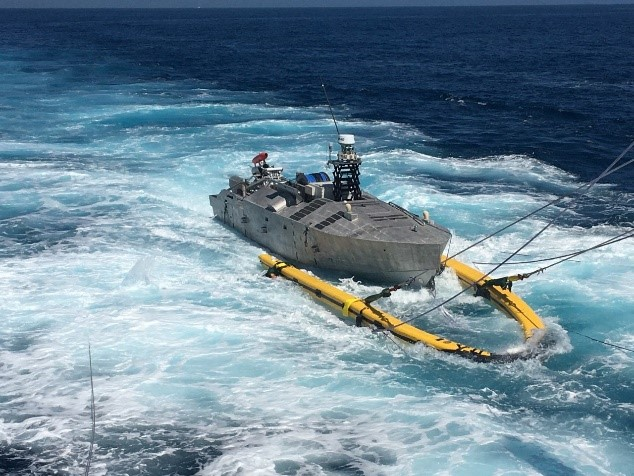The US Navy was recently reported to be building robotic ships to keep up with China's growing fleet. But now, an Initial Operating Capability (IOC) has been granted to the Navy's Unmanned Influence Sweep System (UISS) uncrewed minesweeper, reported first by New Atlas.
The Navy's initiative to introduce uncrewed ships into the fleet to protect people from harm while simultaneously saving costs and enhancing capabilities has advanced significantly with the declaration that the UISS has reached the condition where it is at least minimally ready for deployment.

All About The Minesweeper
The IOC award follows the system's formal testing as well as the delivery of the minesweeping mission package's accompanying logistics and training materials.
The Program Executive Office, Unmanned and Small Combatants (PEO USC) claim that this is an important turning point in creating a hybrid crewed/uncrewed fleet for the Navy.
The Textron Systems-built UISS is a self-propelled, partially autonomous surface craft that can detect underwater mines both magnetically and acoustically.
It will operate from various ships to maintain sea lanes, choke points, operating fleet zones, amphibious landing sites clean of mines, and straits once fully operational.
It will also be replacing the Navy's Avenger-class minesweeping ships and MH-53E Sea Dragon helicopters, as per New Atlas.
The UISS can operate at sea for more than 20 hours and has a top speed range of 87 miles (140 km). At a rate of 20 kt (23 mph, 37 km/h), it can also tow around 4,000 lb (1,814 kg).
The ship's payloads include weaponry, mine-neutralization devices, forward sonar, side-scan sonar, gap-filling sonar, and ISR sensors. With this, it will be able to identify, track, and categorize mines that are bottom, moored, close-tethered, and volume-moored all at once.
Monumental Achievement
It is worth noting that this is the Navy's first IOC of an unmanned surface platform, which is a significant step in the development of a hybrid fleet of manned and unmanned systems.
Capt. Godfrey Weekes, LCS Mission Modules (PMS 420) Program Manager said:
"Over the years, the program has worked tirelessly to mature and field the UISS system that will keep the Navy's most valuable asset, our sailors, safer by keeping them out of the minefield. With this declaration, the program is inching closer toward system-wide IOC for the MCM MP."
He added that UISS's awarding of the IOC serves as a "monumental achievement for the Navy's Mine Countermeasures (MCM) Mission Package (MP).
Related Article : US Air Force Receives First 'Fighter-Mounted Laser Weapon' That Can Combat Hypersonic Missiles!
This article is owned by Tech Times
Written by Joaquin Victor Tacla
ⓒ 2025 TECHTIMES.com All rights reserved. Do not reproduce without permission.




